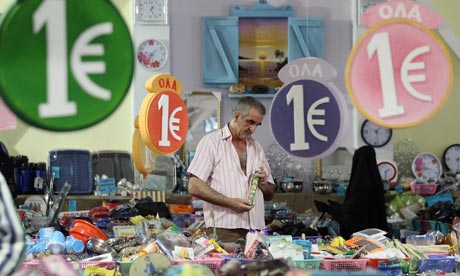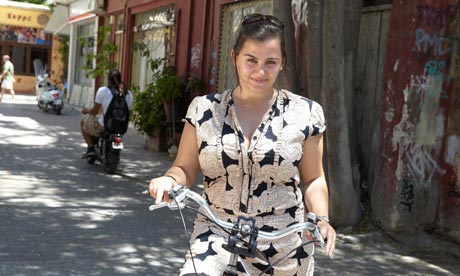What is life really like for Greeks as they face the crisis gripping their country? Four ordinary people tell their stories

Shopping in a 'one euro' store in Athens, Greece. Photograph: Oli Scarff/Getty Images
I have been in Greece talking to real people this week. It's better that way; trying to write about "
Greece" or "the Greeks" or "the crisis" does you no good after a while, because there are so many different realities.
Some people don't seem affected at all. Walk down Ermou Street in central Athens, heaving with shoppers; try finding a table on a crowded terrace off Monastiraki Square; drive through the cosseted suburbs of Kifissia, and you'd never guess there was anything wrong.
But spot a young, cleanly dressed family sitting on the steps of a bank on Stadiou Street, father holding out both hands for money; visit Kyada, a municipal soup kitchen that feeds 1,500 a day; stray beyond where the tourists go, as far as the boarded-up shops and graffiti that says "Greece for the Greeks", and there is another reality.
And beneath it is a deeper, but palpable reality: that far larger forces are playing out here, life-changing decisions being made in distant places. Plus the reality that for a lot of the world, "the Greeks", basically, brought it on themselves.
So it is complicated. You get pushed into narratives that cannot be complete, or even necessarily true. My idea was just to let some Greeks speak for themselves; recount their personal realities.
The single mother: Eleni Trivoulidou, 45, Athens
I'm divorced with four children: a student daughter of 25; a son of 24; and a boy and girl in their teens. They're all still at home. I worked for a while when I was much younger, but I got married at 19 and had my first baby a year later. Then I looked after my children until the youngest left primary school. At first I found temporary jobs no problem, in hotels, a cafe. But for the past two years, there has been nothing.
I get €180 (£145) every two months from the government, because of the kids still at home. My parents give me a bit when I go to see them, but that's not easy now because my father isn't well; we think it's Alzheimer's disease. And anyway, his pension has been cut.
My ex-husband sends me €400 (£320) a month; it pays for the kids' food. And he helps out from time to time with their clothes and a few bills. But we are five almost-grown adults living on €700 (£565) a month. Thank heavens my ex finished paying for the house or we'd all be homeless by now.
It has been so long since I had money I don't know what I'd do if I got some. I'd like to go out sometimes and have coffee with a friend, not just in each other's houses. Or take the children to a cafe. My best friend has a cosmetics shop and lets me pay for what I need, nail varnish, a bit of lipstick, when I can afford to. It would be nice not to make her wait.
I did get a job a while back in an old people's home. They said I was good with old people, but they couldn't keep me. They had to get rid of people; lots of families are taking their elderly back because they can't afford retirement homes any more. I got €150 for the week.
I made one mistake: I should have gone back to work earlier, when my youngest was two or three and the economy was OK. Got a secure job. But my husband didn't want me to, and I didn't push it. Now I'm taking evening classes for my school leaving certificate; I left school at 16. And an accountancy qualification. The trouble is, I'll cost more than someone in their 20s, because my youngest isn't 18 yet. My daughter's generation, they're working for €300 (£240) a month. How are you supposed to build something, start a family, on that?
I could go to Australia: when I was little, we lived in Melbourne; my dad worked in the General Motors factory. I have the passport and a sister, aunts. But the children don't want to. And I feel I'd be giving up. Why should I leave just because politicians have brought the country to its knees? I want to stay and work.
The finance director: Dimitris Koutsolioutsos, Athens
I work for my uncle's firm, a big name in jewellery and duty-free. I've just set up this scheme, Gineagrotis – "Become a farmer". It's not complicated: city-dwellers rent a patch of land from a farmer, tell him what they want him to grow on it, and get their own fresh vegetables delivered to them weekly.
It's about creating a direct connection between the consumer and the producer. The farmer's happy because he knows in advance what and how much he has to plant, and he sells all he grows. It's a regular, guaranteed, stable income; customers commit for a year. And the consumer gets fresh veg for 70% less than at the supermarket or greengrocer's.
You go online, opt for one of three plot sizes from 50 sq m to 100 sq m, and choose from 10 summer and 10 winter vegetables. It costs from €14.20, to feed two people, to €20.90 a week for five or more. The veg are delivered within 24 hours of being picked, and if you are away or on holiday, you can ask for them to go to a soup kitchen in Athens. From September, you can donate some vegetables weekly.
It's really, really taken off. Amazing. The site has been up two months and we've had more than 5,000 accounts created, and 900 farmers sign up. Last week, we started deliveries to the first 100 families from the first four farms. In September, we plan to offer olive oil, eggs, even your own sheep or goat; you just need a big freezer, or lots of friends.
I'm working 18-hour days and spending half my time on this, with friends. I've put in about €40,000 (£32,000) of my own money, and I'm 100% confident in the business plan. For farmers, it's all they ever wanted. For consumers, it's quality fresh food, cheaper. We're fulfilling real social and economic needs. Greece is full of initiatives such as this now; people are starting to realise we can and must do things ourselves – change from the bottom up.
The businessman: George Efstratiadis, 38, Patras
My grandfather came here with his family from Turkey in 1922. He made a living hawking sewing needles and cloth around the villages, and selling olive oil and eggs back in town. My dad was an electrician in the factories that existed then in Patras. In 1968, he started his own company. My brother, my sister and I took over in 2000. We specialise in water pumps, for all sorts of uses, from big waste-water and irrigation projects to swimming pools and homes. We sell to contractors, municipalities and utility companies. In 2009, we turned over €8.8m (£7m) and had 67 employees. By last year, our sales had halved, and this year we expect €2.5m (£2m): back where we started.
The transition from plenty to hardship has been fast. Every three months I make tough decisions, and every three months they're never enough. The first sign was when Athens didn't put 400 planned waste-water projects out to tender. Then private contractors started delaying payments; I have maybe half a million euros in unpaid bills. Then the public-sector customers just stopped paying altogether.
We had to cut costs. I shacked advertising to zero. I slashed travel. I rolled over loans, halved our repayments. I reduced the office space, renegotiated rents. But the biggest expense is wages. We're a family firm; we're extremely sensitive. In all our history, we had never fired a single person. But I had to start letting people go; two or three a month – the law doesn't allow more than that. I've had to fire 39 people.
Last year, every time I went up to a colleague, they would look at me in fear. I've cried tears with my employees, we've hugged each other. A few got angry. But most understood this was not my choice; we could just no longer afford their salaries. And behind each of them is a family.
This year I have cut working hours, to six or four hours a day, to avoid more job losses. It's been the worst experience of my life. Devastating. I've worked here – sweeping flooors, running errands, doing filing – since I was six. But without the cuts, we'd have been bankrupt by early last summer.
I don't think there's a politician alive who can solve Greece's problems at this moment. Attitudes to easy money have to change here, and that'll take an earthquake. But we can't keep squeezing people, increasing taxes, piling on the pressure. The election result was a victory for the austerity terrorists. I expect harder strikes, bigger riots and an unstable future.
The civil servant: Dominique Vitzileou, 39, Athens
I work for the organisation that gives Greek farmers their EU subsidies. I have been there 10 years. My pay's been cut 30%. I can't go on holiday. But then I'm not even sure I'll have a job in three months' time, or that the state will be able to pay me.
I am anxious. I do worry. The fear comes slowly; it kind of crawls into your mind. You think, what's my future going to be? But you can't let it rule you.
When the government introduced this new house tax – €5 for every square metre of your apartment in my part of town – and included it in the electricity bills so that people's power would be cut off if they didn't pay, I couldn't accept it. Not for me, for the old people, unemployed people with children. I helped organise a neighbourhood protest.
I really don't know how this will end. It's going to get more painful, certainly. It's really unbelievable what's happening. I can't believe I'm caught up in something so exceptional that I've become someone worth interviewing. But every day, there's something new. Recently it was the phone company. They want to put some of their staff on two-hour working days, and pay them €140 (£113) a month. With no health insurance, nothing. Can you believe this?
And out at Lavrion, the refugee centre outside town, there are 85 children not being fed. Immigrants get stabbed in the metro by neo-fascists, and no one is arrested. My neighbours, with two children, live on €350 (£280) a month unemployment benefit. Medicine is in short supply. What do [IMF managing director] Christine Lagarde and the others want: people crawling, dying in the streets? Jumping off balconies?
I'm not sure this new austerity coalition will last long when people take to the streets. If the troika doesn't change its approach to the so-called "Greek problem" things will end very badly. There'll be new elections in the autumn. The worst is yet to come.
You know, I gave food for the asylum for people with terminal illnesses in Kypseli yesterday. The staff haven't been paid since February, and 260 patients haven't got enough food. Our crisis is this: the old is dying, but the new cannot be born.










